"Sometimes I think that Oleksii is lying sick in captivity. Hope smoulders in my soul." In memory of the Azov fighters killed in Olenivka
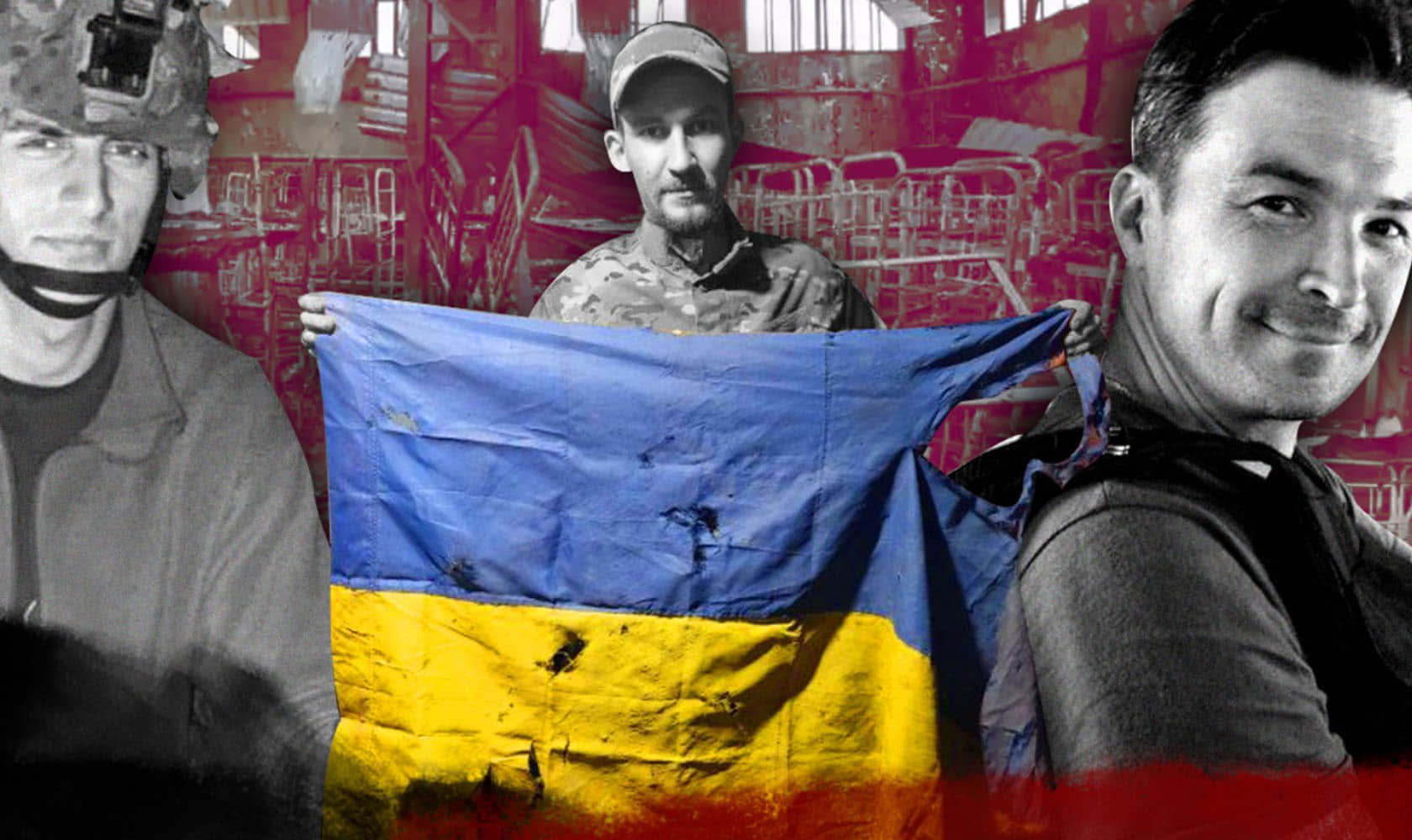
A year ago, on the night of 28-29 July, the Russians treacherously killed at least 53 defenders of Mariupol. The Russians caused an explosion at the barracks of the Olenivka prison, where 193 Azov prisoners of war had been transferred the day before.
For several hours, the Russians did not allow doctors, even those who were detained in Olenivka, to access the site of the terrorist attack.
Later, Russian propagandists published a list of the names of 46 people killed, but the actual number of dead was higher. Some of the wounded died on the way to the hospital.
After the tragedy, the bereaved relatives encountered inaction on the part of the International Committee of the Red Cross (ICRC) and the UN. None of the "human rights defenders" came to the scene of the crime and the [UN fact-finding mission established after the explosion – ed.] was soon disbanded.
In the autumn, Russia returned the bodies of those killed, but most of them were in such terrible condition that they could not be identified without DNA analysis.
Now, the relatives of the Azov Regiment’s fighters are asking the state to start the Days of Mourning and Commemoration of those killed as a result of the terrorist attack.
"Ukrainska Pravda. Zhyttia", together with the Association of the Families of Azovstal Defenders, is honouring the memory of the heroes on the anniversary of the tragedy.
Here are just a few of their stories.
Oleksii "Lev" (Lion) Kisilishyn
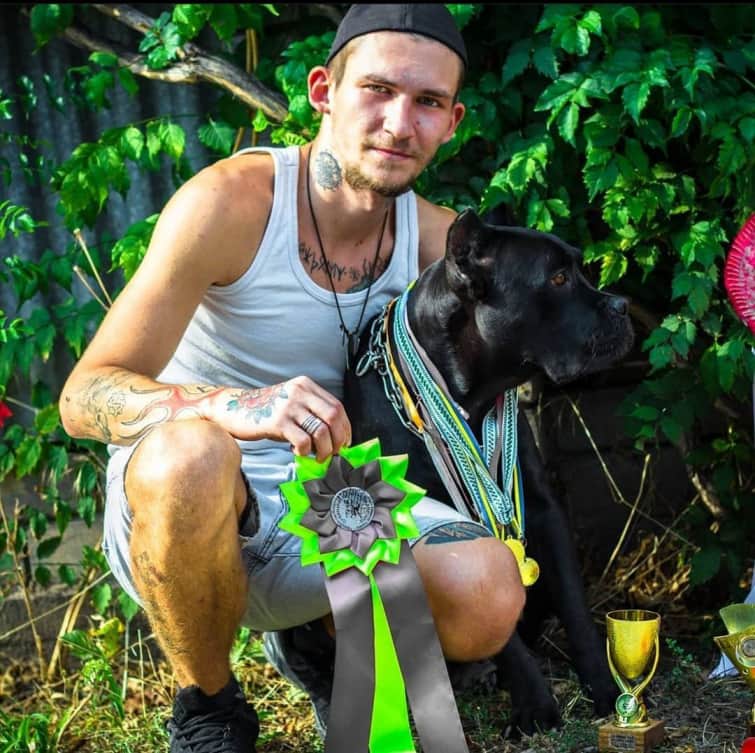
Oleksii Kisilishyn is a military serviceman and animal rights activist from Mariupol who is now forever 26 years old.
The story of the fighter is told by his father, Oleksandr, known under the alias Sarmat, who nine years ago was "in the basement" in Horlivka for his pro-Ukrainian position, and since 2015 has served in Azov [to ‘be sent to the basement' means being illegally imprisoned by Russian occupying forces or authorities, usually in the basement of some building that served as a torture chamber].
Father and son were the best of friends – together, they defended Mariupol, fought at "Azovstal", and were captured.
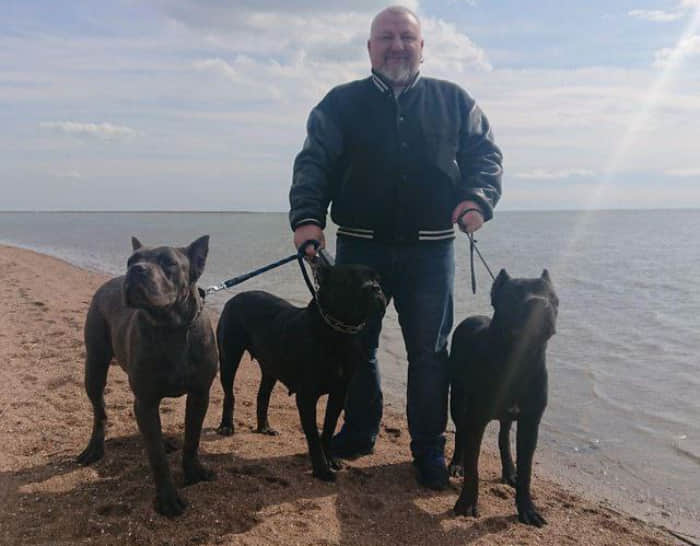
Oleksii started serving earlier than his father - at the age of 17, he joined the army without telling his family.
"In the summer of 2014, my son said: 'I'm going to Kyiv to study veterinary medicine.' Oleksii was very fond of animals; it was his life's dream. And then he sent me a photo from the Azov selection camp. Later, we served together in the mortar division." says the father.
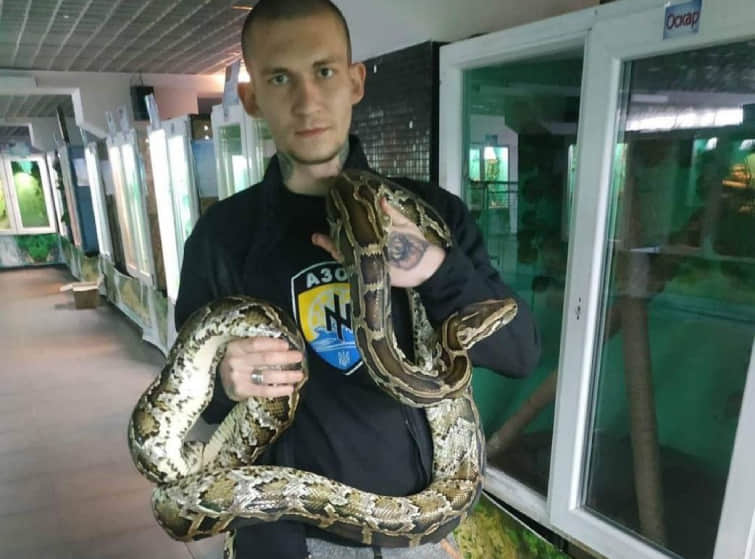
Oleksii served with Azov until the end of 2015, and when active hostilities decreased, he began to work in animal protection in an improvised shelter in Mariupol and at the Centre for the Rescue of Wild Animals in Kyiv Oblast.
During the full-scale invasion, Oleksii was in Mariupol and decided to return to Azov. His father told him to take his family and leave, but Oleksii was categorically against it. He desperately wanted to take part in the fighting.
"Since 24 February, there were periods when we could not see each other for a month when we were in different areas. But at other times, we were together. I constantly asked through acquaintances how my little one was," the father recalls.
After 6 March, father and son moved to the left bank of Mariupol and actively participated in the battles, holding back Russian tanks and armoured personnel carriers.
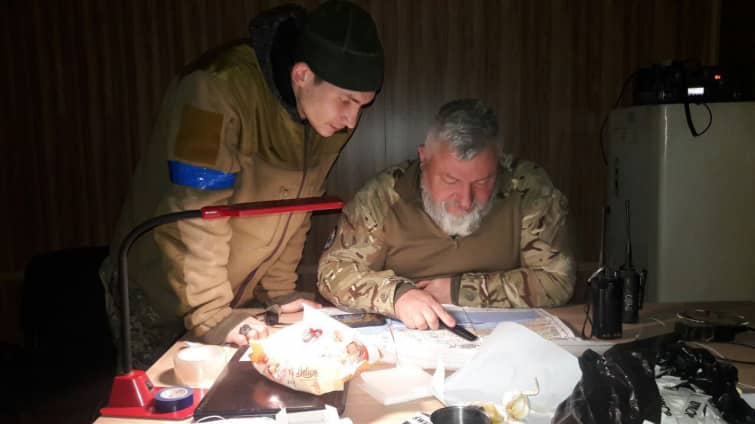
There were about 15 people under Oleksii’s command, even though he was an ordinary soldier. Sarmat mentions that during the defence of Mariupol, ranks did not matter, only actions.
"Oleksii went by the alias Lion because his sign is Leo, and at home, we always called him Liova. Sukhar, the commander of the Azov Regiment’s 1st battalion, who died of a heart attack after being captured, once told Oleksii: "You took this alias for a reason, because you fight like a lion".
I had a lot of respect for Sukhar. It was the highest praise for me as a father," Oleksandr says.
During the defence of the left bank [of the Dnipro river], Oleksii started to have problems with his back due to the heavy loads they had to carry. He could not stand or walk, so he was taken away for treatment. At that time, many soldiers died at their positions, and Lion felt guilty for staying alive.
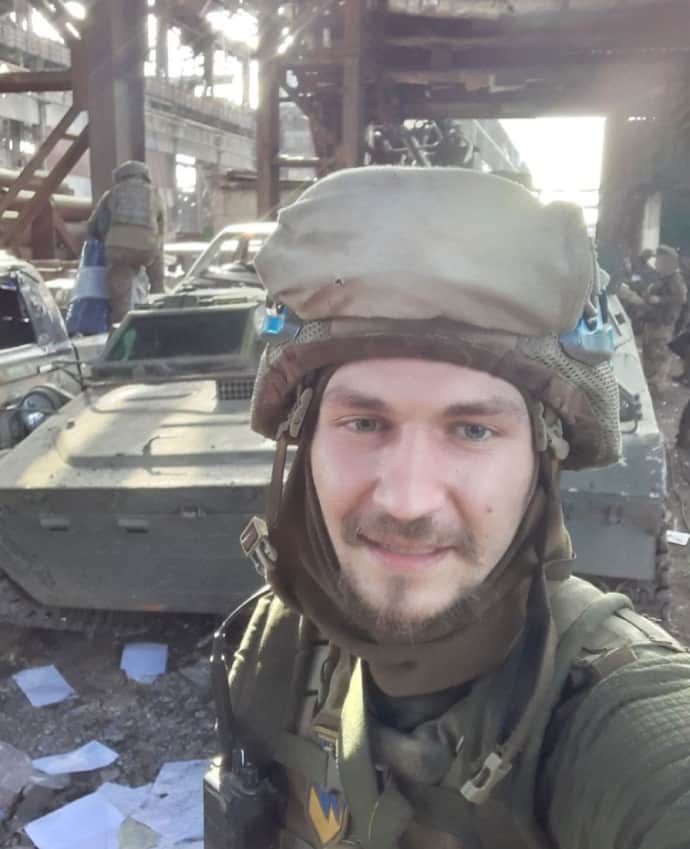
When the circle closed around Mariupol, the fighters retreated to the Azovstal steel plant, which became their fortress. Father and son continued to perform combat missions and delivered food, water, and fuel for generators to the front line.
On 11 May, Oleksii was once again a step away from death – a Russian aerial bomb hit the "Shop 10" bunker.
"I will remember this day for the rest of my life as my birthday. It was the first time I cried. There was smoke, fire. We were helping others to escape, and we couldn't see each other.
I lost Oleksii and thought that he had burned alive in this bunker, and he thought the same about me. Then, a few hours later, they told me that my boys were alive under the blast furnaces," his father recalls.
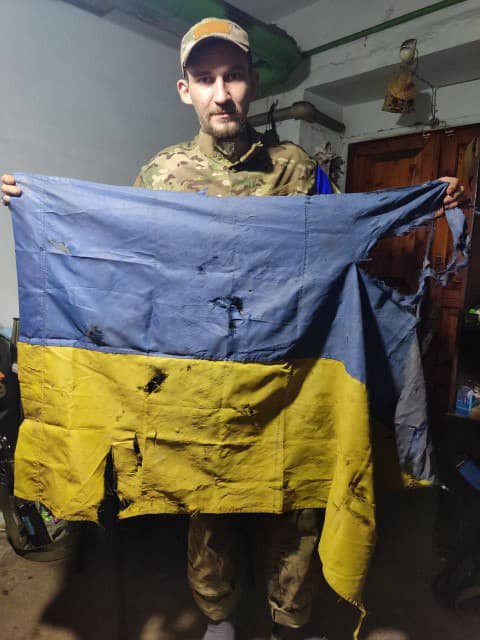
The soldiers retreated to another bunker, and on 16-17 May, Redis, the commander, announced the arrangements for departure.
"Denys [‘Redis’] Prokopenko is a person who has such authority that if he came and said, That’s it, guys, we are going on the last battle,' we would follow him to hell or heaven. He said: "A difficult decision has been made; we are going into captivity".
It was agreed that the Red Cross would be there and the Geneva Convention would be observed. We carried out the order," says Sarmat.
The defenders of Azovstal began to leave gradually because, in addition to Azov fighters, there were marines, patrol police, and border guards – more than 2000 fighters in total.
Oleksii and his father left on 18 May and two days later they were at the 120 Olenivka colony. The men lived together in barracks housing more than 200 people.
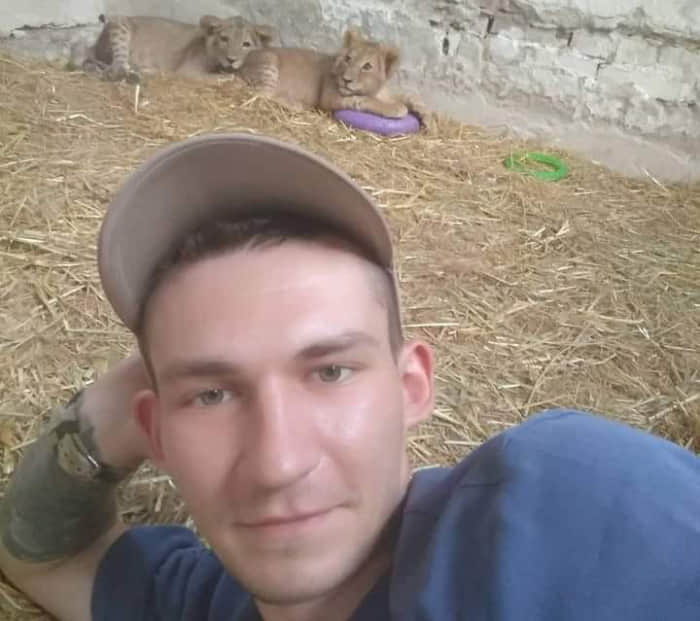
"On the morning of 27 July, I was transferred to the Donetsk pre-trial detention centre, and Oleksii and some other guys were taken to an industrial hangar, where they used to repair equipment. On the night of the 28th to the 29th, it was blown up," says Oleksii’s father.
On the same day, Sarmat learned about the explosion, and in the middle of August, his father entered the cell and confirmed the news about the death of his son.
"I was still hoping that he was wrong. But when they were taking us to the [prisoner] exchange, they said that it was true. I was leaving captivity with the guy who pulled him out of those barracks; he had tried to administer first aid. They pulled Oleksii out and tried to stop the bleeding, but nothing could be done.
And they [the Russians - ed.] stood nearby, laughing and pointing their fingers. The first doctors, from among the captured soldiers, appeared an hour or an hour and a half after the terrorist attack. They were simply not allowed to help. The whole area was on edge after this explosion and no one slept. Everyone heard the screams of our guys," says Oleksandr.
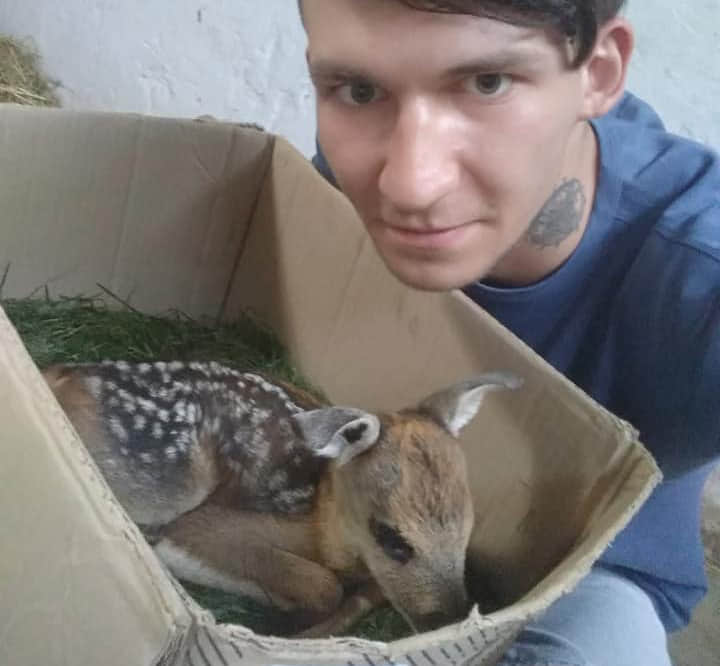
On 21 September, Sarmat returned to Ukraine as part of one of the largest prisoner exchanges, and in October, the Russians returned his son's body.
In February 2023, the animal protection organisation UAnimals awarded Oleksii Kisilishyn the first "All-Ukrainian Animal Protection Award" posthumously.
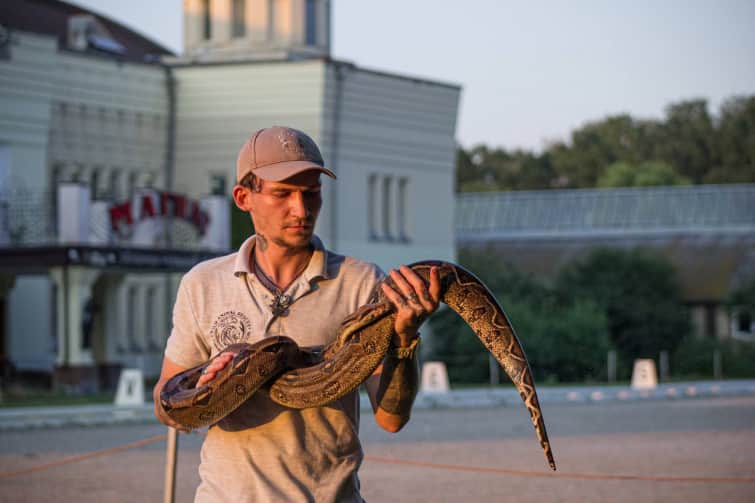
Mom and Dad were presented with an award and promised that after the liberation of Mariupol, there would be an animal protection centre named after their son.
"Oleksii was determined and stubborn. At the same time, he was very kind. Especially when he helped animals," Oleksandr notes.
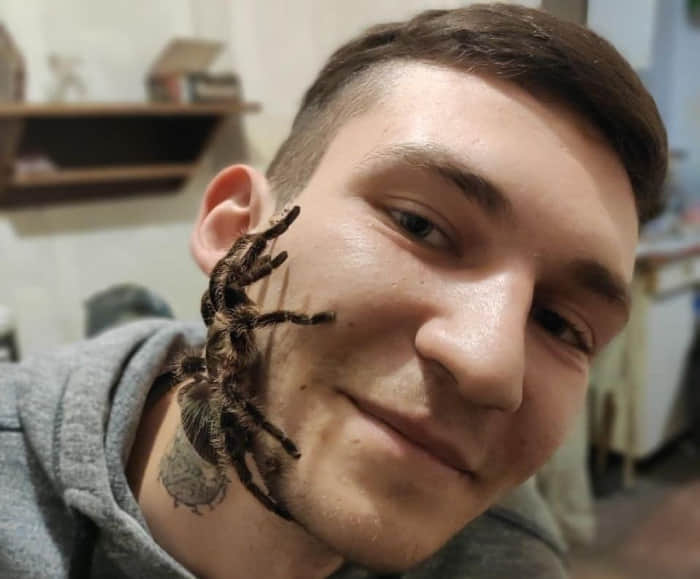
In the yard of his house in Mariupol, he had set up a shelter for rescued animals, including exotic pets. He also had a dog of his own.
"He went to lakes and rivers and rescued animals and birds. We had foxes, swans, puppies, and owls in our yard. Once, he went to rescue a jackal that got lost in Mariupol.
And most of all, he loved snakes and spiders, to which he allocated a separate room. The truth is, I almost never went there," the father recalls.
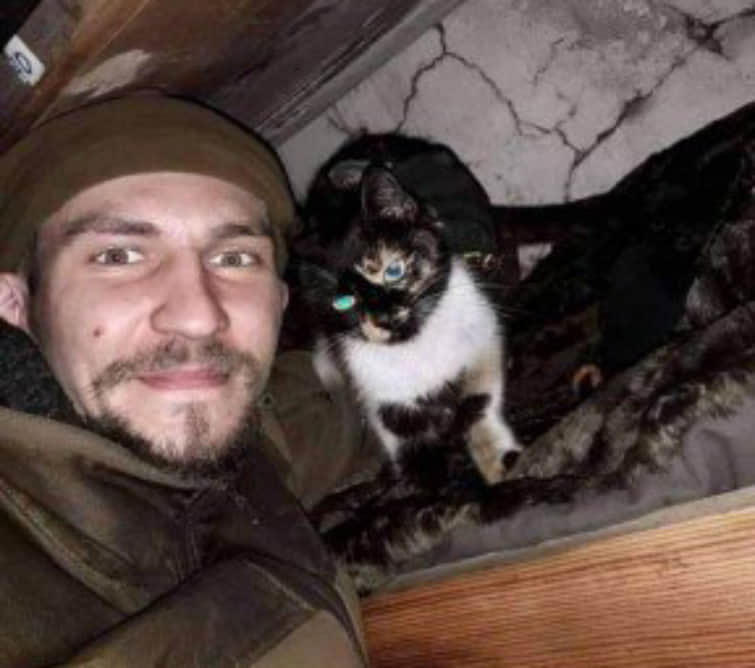
For some time, Oleksii worked as a keeper at the Natalia Popova Wild Animal Rescue Centre. Working at the same site, in the Mahnat equestrian sports complex, there was a young woman, Victoria, with whom Oleksii fell in love.
Even at Azovstal, Oleksii tried to save animals, sharing his last bits of food with them. A few days before the departure from Azovstal, he talked about his feelings for his beloved Victoria via SMS.
"I told him, 'Come back, I'm really waiting for you, and we'll solve all the issues together'. Although we didn't date, we had a lot of common interests. We were very close friends," says Victoria.
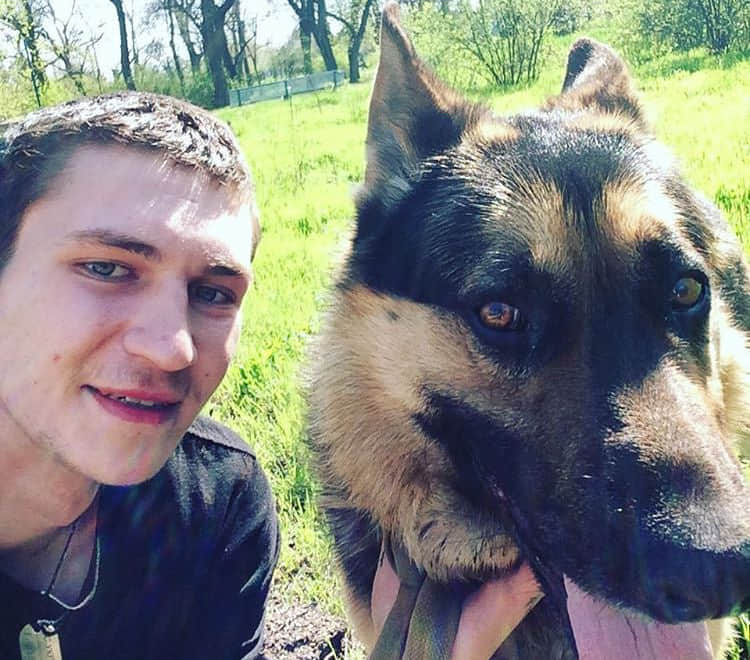
Oleksii had no children, but after leaving captivity, he wanted to become a father as soon as possible. Unfortunately, even his "four-legged children" did not survive the war.
"His dog died back in March. We had given it to the shelter of the Ukrainian Kennel Association, the head of the Mariupol branch. Now this monster has sided with the Russians and has already forgotten that she is Ukrainian. She claims that the shelter was hit and all the dogs died.
We released the fox into nature because there was no other choice. And spiders and snakes, unfortunately, froze – we didn’t have electricity or gas. Oleksii managed to cure the swan and release it," says the father.
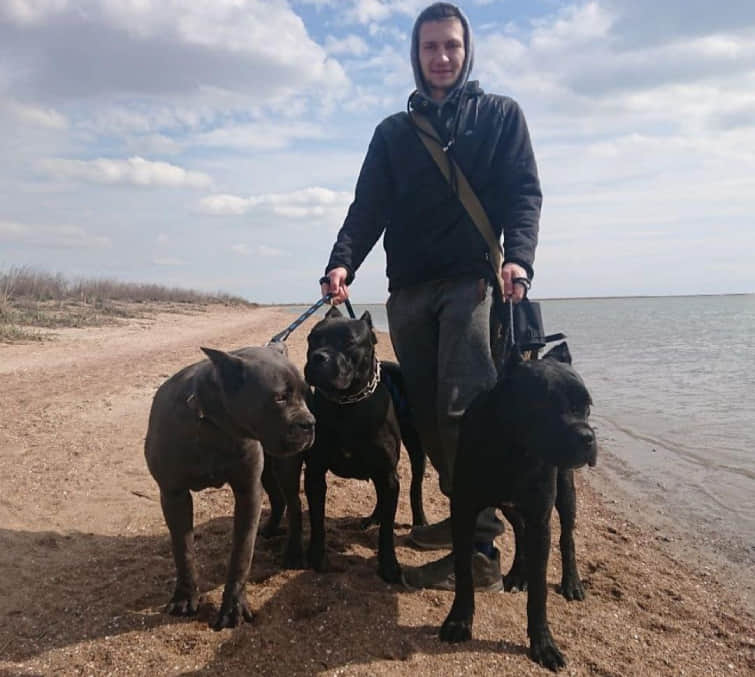
Oleksandr still cannot accept the death of his son and sometimes believes the DNA test was wrong.
"Sometimes I think that Oleksii is lying sick in captivity. Hope still smoulders in my soul, although there are witnesses...
Now my greatest wish is that a woman will turn up and say that she had Oleksii’s child. I would do anything for them," adds his father.
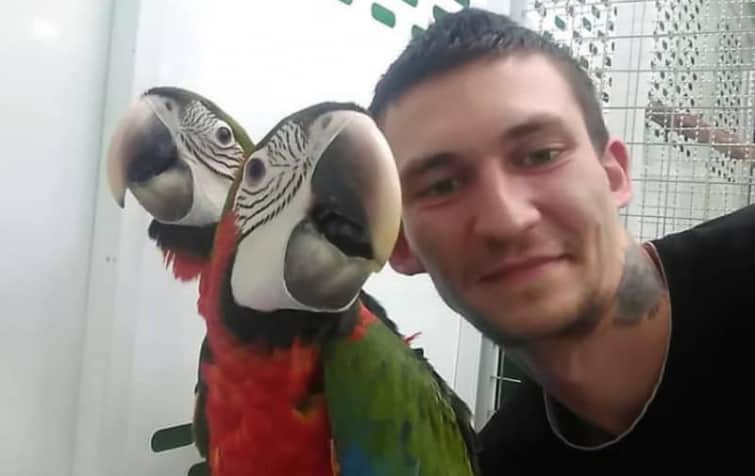
Sarmat returned to the army in February and plans to fight until victory, until the Ukrainian flag flies in Horlivka. In March, he buried his son in Chernihiv Oblast.
"Ironically, Oleksii died in Olenivka, Donetsk Oblast, and was buried in Olenivka, Chernihiv Oblast. I had been planning to move there for a long time after completing my military service. I will be close to Oleksii," says his father.
Serhii "Bashnia" (Tower) Petrenko
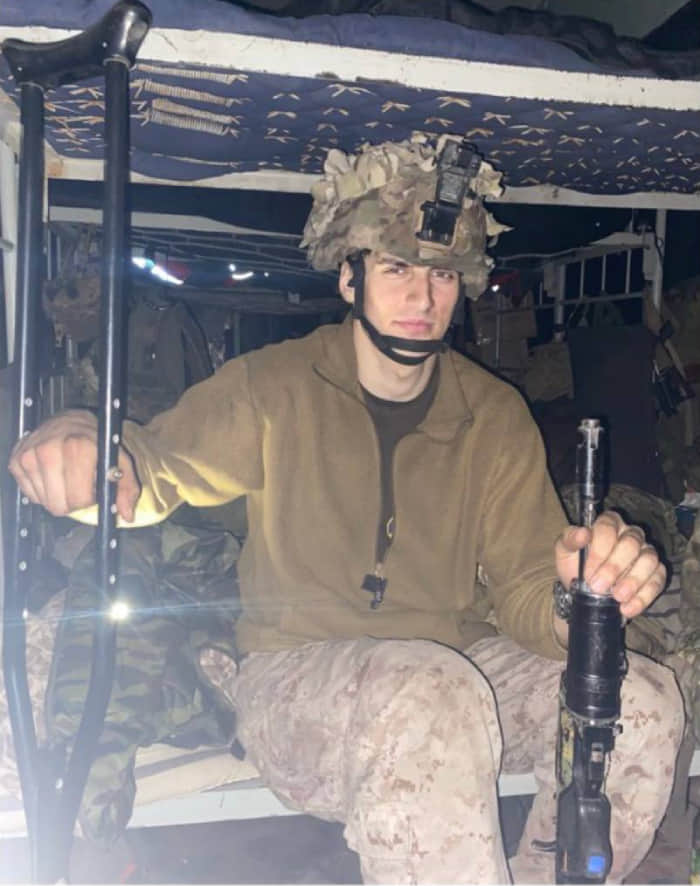
Serhii Petrenko, who was known by the alias Bashnia, was a patriot and soldier from Kyiv who was killed a month before he turned 26.
Bashnia joined the Azov Regiment in 2017, right after graduating from university. During his student years, he attended patriotic lectures and preparatory courses, and then he underwent basic training in order to be able to join the Azov Regiment.
He failed to pass the test the first time due to pneumonia, but after treatment he became a mortar operator. Being 195 centimetres tall, he was immediately approved for this position.
During the last year of his life, Serhii worked as an instructor at the Yevhen Konovalets Military School. Nine months before the full-scale war, he met his love, 32-year-old Olia.
She used to work at kindergartens and has been helping Azov soldiers since 2014. Last year, she co-founded the Association of the Families of Azovstal Defenders.
Olia recounts the romantic story of how they met:
"Serhii was participating in a cross-fit competition. I came with my dog to support my friend Piston, and met him. You could say that my dog Viking brought us together. While I was talking to my friend, my dog started playing with Serhii's ball.
It was love at first sight. Before the full-scale war, we were together for nine months. Once I asked him if we were dating, and he said: ‘Olia, I will marry you!’"
Bashnia defended Mariupol starting on 24 February and took part in street combat. On 25 March, his friend Piston (Maksym Kahal) was killed and Serhii was injured.
"As far as I know from my friends, Serhii fought very well in Mariupol. As they say, 'he gave it his all'. Then, he injured his right foot. He had it patched up in a field hospital at the Azovstal steel plant.
At first, he didn't tell me about the injury, I found out from his friends. He didn't complain at all, he just said that he felt bad because the guys were fighting and he should have been with them, but he couldn't run because of his injury," says Olia.
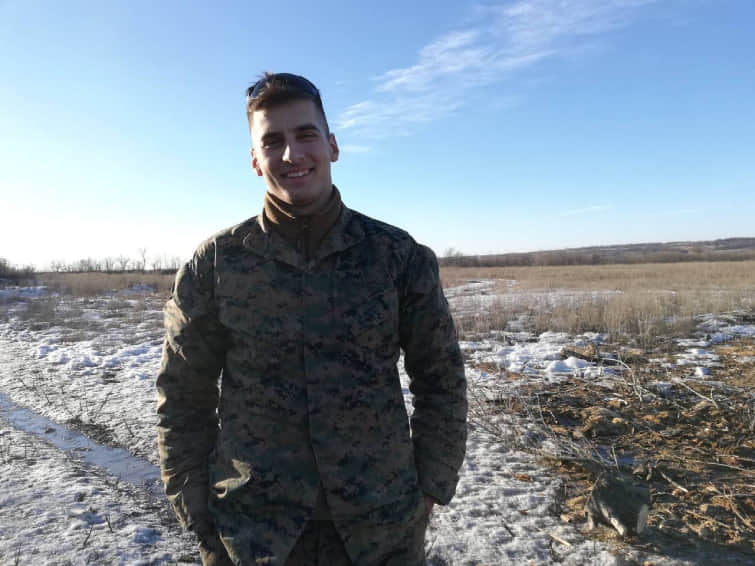
Right after the soldiers left for the Azovstal steel plant, the couple communicated frequently, but in April there were fewer Starlinks [satellite internet providers – ed.], and the Russians were hitting the plant with everything they had. The connection was unstable, so Serhii could write to Olia only once every 7-10 days.
The wounded Serhii was supposed to be evacuated from Mariupol by helicopter, but the flight did not take place. However, the only thing that upset Bashnia was that he could not fight.
"It is very valuable to me that Serhii did not spiral or make me feel bad. He constantly reassured me that he would come back and that our plans for the future would be fulfilled. We dreamed of living in a house in the woods somewhere in the Carpathians after the victory, travelling a lot.
In our chat, we discussed what kind of children we would have (whether they would be as tall as him) and what kind of grandchildren we would have. We always planned for the future in the most difficult, darkest times," says Olia.
Serhii wanted to live in Ukraine, but he looked up to the US Marines. At the Azovstal plant, he texted Olia a huge list of things he needed to to replace his uniform and lost equipment.
"He said: ‘It's very important for me to know that my armour is waiting for me at home.’ And, of course, I started ordering uniforms from the US," Olia recollects.
On the eve of the remaining soldiers leaving the Azovstal plant, Serhii wrote that he did not want to do it, but Olia persuaded him to save his life.
"He texted that he would leave only for the sake of our love. When he got in touch from Olenivka, we just exchanged a few words: 'I love you, I'm waiting'.
He wished me a happy birthday on 18 July 2022. Eleven days later, my life ended when his heart stopped beating as a result of a terrorist attack," says Olia.
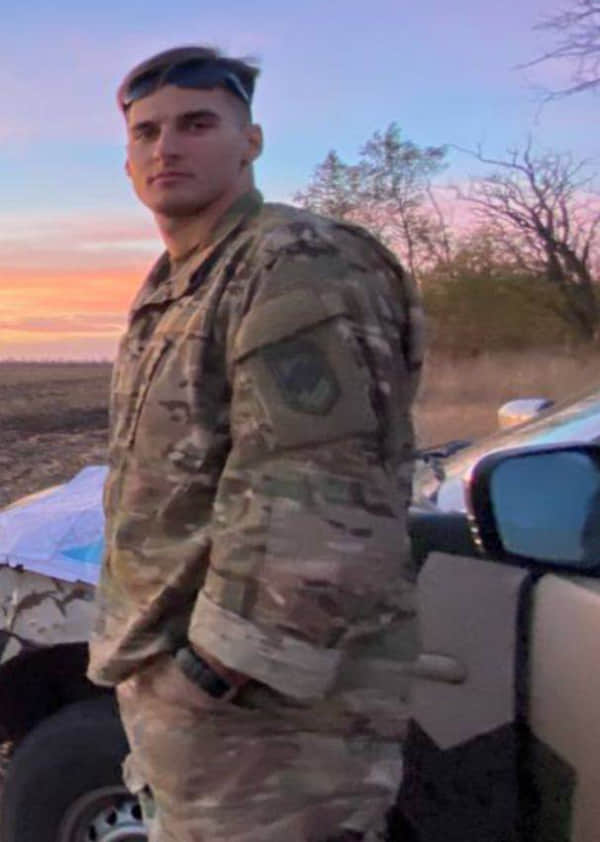
On 29 July, Olia was in hospital because her friend's girlfriend, who was also in captivity, was in labour. Olia's phone started ringing off the hook, and information about the attack appeared in Azov chat groups.
"When the photos and videos were posted, everyone was watching them and looking for their loved ones. There were horrific shots of burned bodies on beds, and it was hard to tell who was where. Russia posted a single list on their Telegram channel. This list has not been confirmed by any party to date, but it more or less matches the DNA tests.
I saw the name of my Serhii on the morning of 30 July. I fell to the floor, cried a lot, and everything inside me just stopped, froze," Olia recalls.
For the first three days, there was no confirmed information, and the International Committee of the Red Cross was simply inefficient, even though it was supposed to guarantee the safety of the prisoners.
Until September, Olia assured herself that there had been a mistake and that the list could not have been compiled so quickly. But after the prisoner swaps, the released soldiers from the Azov Regiment confirmed that they had witnessed Serhii's death.
In October, the Russian side handed over the bodies. Among those killed were several prisoners who had been reported as wounded. When the first DNA match was made, all hope vanished.
Olia saw her boyfriend’s photo and identified him at the morgue. But Serhii has not yet been buried, as the family is waiting for a second DNA test.
"Serhii is the best thing that ever happened in my life. He was a reliable friend and brother-in-arms. Despite the fact that he was serious and strict in public, he had an incredibly kind heart, and he opened up in relationships. Even when he was at the Azovstal plant and talked to me from captivity, he always asked about me and emphasised that he loved me very much and that everything would be fine.
I don't like being told that life goes on and I will have new relationships. Serhii is my life and my universe. I am sure that I will never have any other man by my side," says Olia.
Addressing civilians, Olia asks them to remember the heroes of Mariupol.
"Hundreds of thousands of people have lost their other halves and loved ones for the sake of us living in a free Ukraine. For people like me, life ended when our loved one died. Now there is only existence.
But Ukrainians should live with dignity, support the military and remember the cost. And to live in such a way that it will not have been in vain," Olia says.
Now Bashnia’s fiancée is doing everything she can to bring every Azovstal defender back from captivity.
"Azov was a second family for Serhii. I want them to survive and come back home as soon as possible.
And if there are other worlds, I dream of meeting Serhii," adds Olia.
Dmytro "Elektryk" (Electrician) Krukovskyi
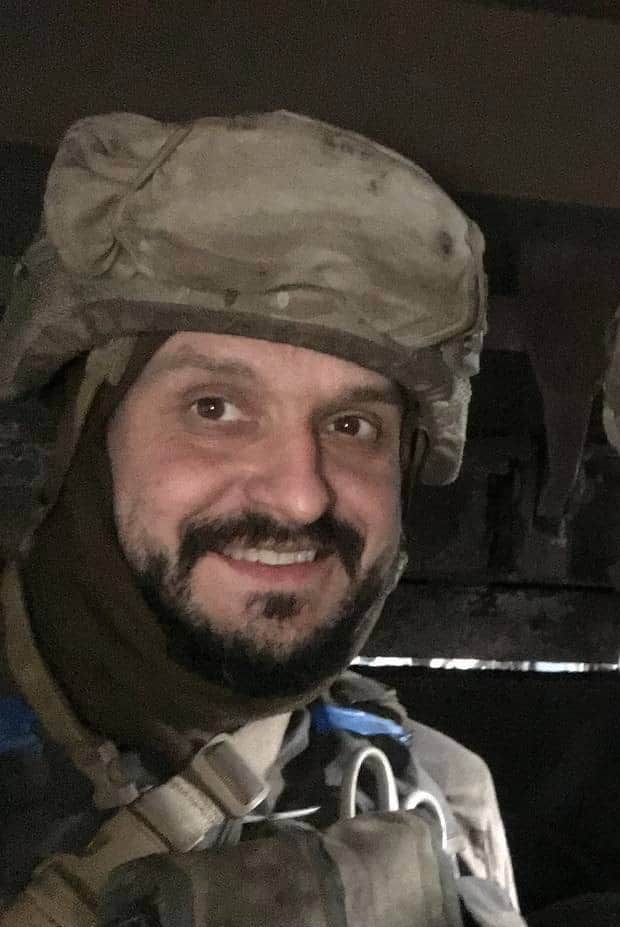
Dmytro Krukovskyi, 38, was born in Bila Tserkva. He loved sports and used to do athletics when he was a child, but he stopped training after suffering a knee injury.
Dmytro entered the Institute of Computer Information Technologies (ICIT) of the National Aviation University of Ukraine in 2001, majoring in programming. He worked as an automotive electrical engineer until 2014 and knew his way around machines.
Dmytro’s sister Liudmyla mentions that her brother had a keen interest in cars and could repair anything that no one else could. He also had a sharp sense of justice and a kind heart.
"Dima [diminutive form of Dmytro – ed.] was very kind, had many friends and came to everyone's aid. Girls loved him. He had a clear head and hands that were worth their weight in gold.
He got married in 2007 and had a daughter, Anastasiia, a year afterwards. However, he and his wife divorced nine years later. Dmytro went on to volunteer when the Maidan [2014 Revolution of Dignity] started. Dima didn't serve compulsory military service because of his knee, and when he decided to join the ATO, he really wanted to join Azov," says Liudmyla. [The ATO or Anti-Terrorist Operation is a term used from 2014 to 2018 by the media, the government of Ukraine and the OSCE to identify combat actions in parts of Donetsk and Luhansk oblasts against Russian military forces and pro-Russian separatists – ed.]
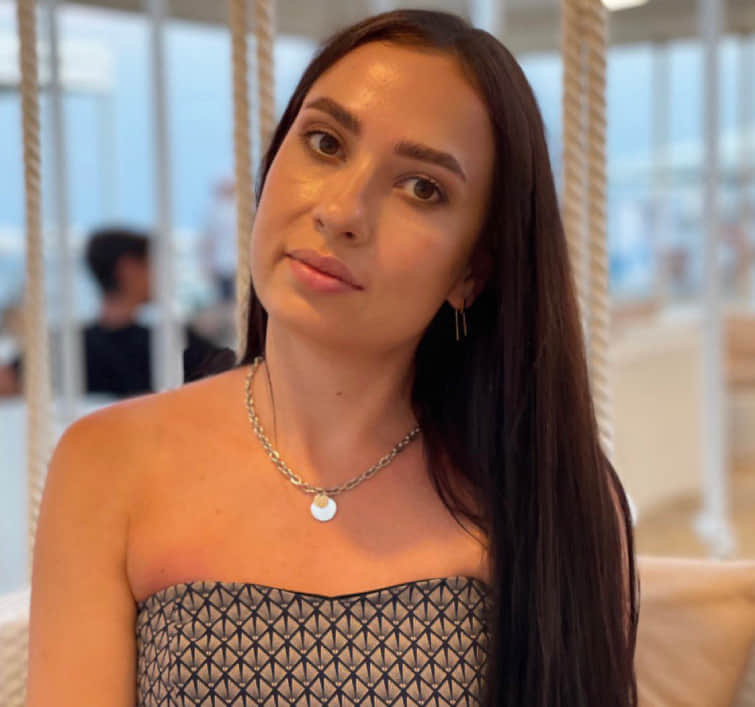
Dmytro would not be assigned to a combat position because of his sore knee, and so instead he served with a repair company, earning him the alias Elektryk.
Along with an engineering team, Dima was developing the multifunctional Buggy and repairing military equipment as part of his work at the front.
Dmytro stayed in Mariupol after the end of his military contract. He met his love and set up his own business.
"The couple decided to go into business: they bought apartments, renovated them and offered them for rent. His girlfriend was a furniture maker, and Dima himself had a great deal of handyman skills.
During his visit at the end of September 2021, he said: 'We'll finish the apartment, and then we'll relax and enjoy life.' They planned to go on holiday in March. Sadly, it didn't work out," says Liudmyla.
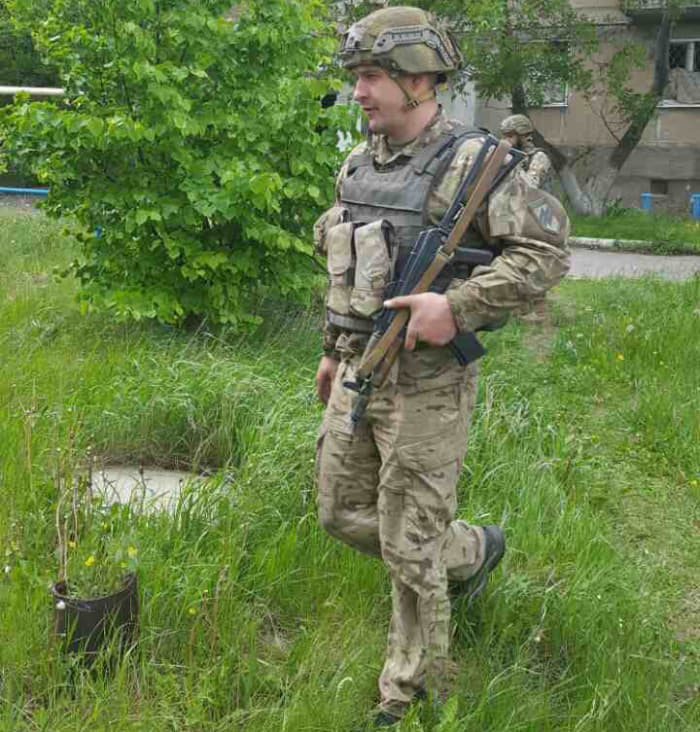
On 22 February, Dmytro warned his family that there would most likely be war. Elektryk was called up for service by his brothers-in-arms, and besides, he wanted to serve with his comrades again. He greatly respected Denys "Redis" Prokopenko, Commander of the Azov Regiment and the Azov command in general.
Elektryk stayed in the village of Sartana in Donetsk Oblast on 24 February and then in Mariupol. He would call his family once a week to comfort them.
"Dima said he was alive and would send us a few videos from Sartana or Mariupol. These were rather short and infrequent calls, as he had to spend 40 minutes travelling from his position to make them.
We talked more when they got to Azovstal. He was deeply concerned as his friends were dying. He told us that they had to get out of challenging situations and come under fire during missions. He said the guys from Azov were doing the impossible.
He always joked when we asked him about the situation. He never lost heart," his sister recalls.
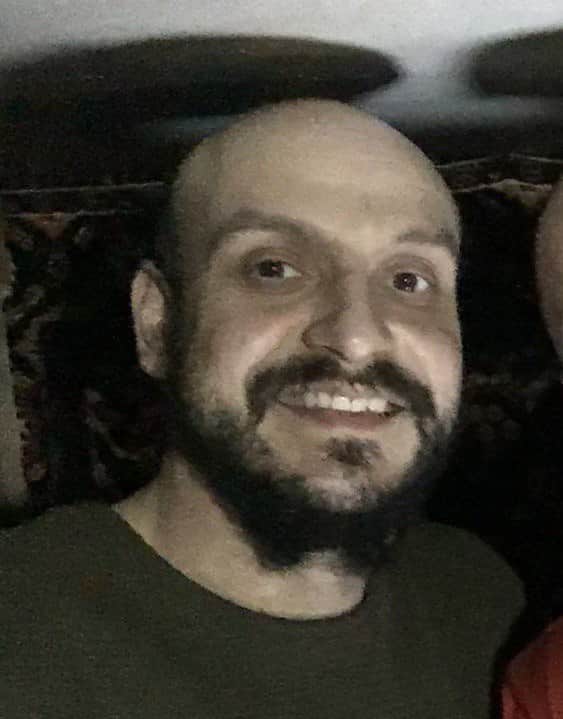
Elektryk's girlfriend stayed in Mariupol to be near him, but the couple couldn’t see each other.
The last time they met was on 26 February, when Dmytro and his brothers-in-arms brought her drinking water. It was the happiest day for Dmytro when they got on the phone in late April, his sister says.
Azovstal's defenders held the line for three months under constant Russian fire, with a shortage of medicine, water and food. The cooks tried to make soup or pasta from leftover food. One of the most delicious dishes for Dmytro Krukovskyi was "paska", a flatbread baked in Azovstal's underground for Easter.
Elektryk said they lacked medicines and many soldiers were wounded.
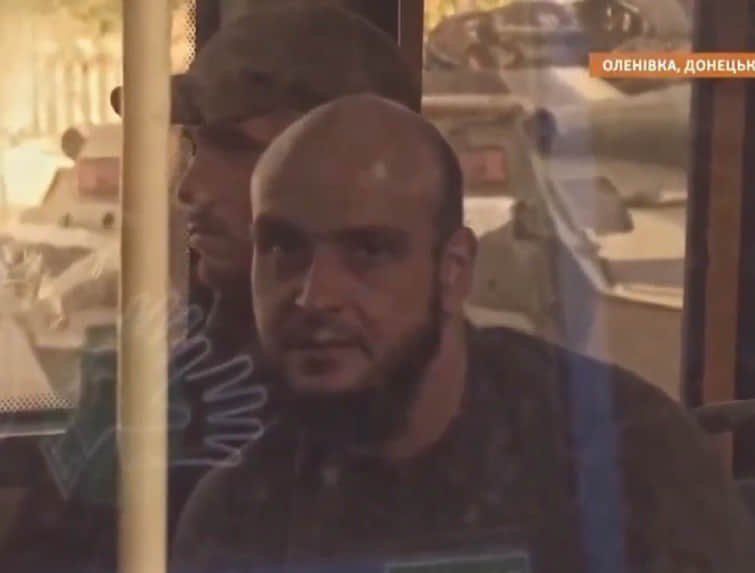
Before leaving Azovstal, Dmytro texted his mother, saying they had been promised good conditions, food and a prisoners-of-war exchange within 2-3 months, but there would be no further contact with him. The family hoped for some proof that he was alive.
"We felt more or less calm because he had saved his life. Many videos and photos caught him as he was on the bus. We worried, but there was a certain calm; seeing he was fine, we just had to wait.
Then he called from Olenivka several times late at night. He said he was fine, saying he loved everyone. He called back on 10 July to say he would see us soon. He would call before the prisoners-of-war exchange. We were looking forward to it. There were no exchanges. And then this news..." Liudmyla recalls.
Liudmyla's family was not sure whether the lists of those killed were accurate. The Azov Regiment Patronage Service was doing everything possible to help the families, although international organisations provided no information.
"When the guys were leaving Azovstal, the Red Cross was there and filled out forms for each of them so that they could be identified. But as it turned out, these forms were lost, and many of the guys were not on the Red Cross list at all.
It was very unprofessional. The Red Cross did not identify my brother before the terrorist attack, although he was on all the videos and filled in everything. And the situation is similar for many people," says Liudmyla.
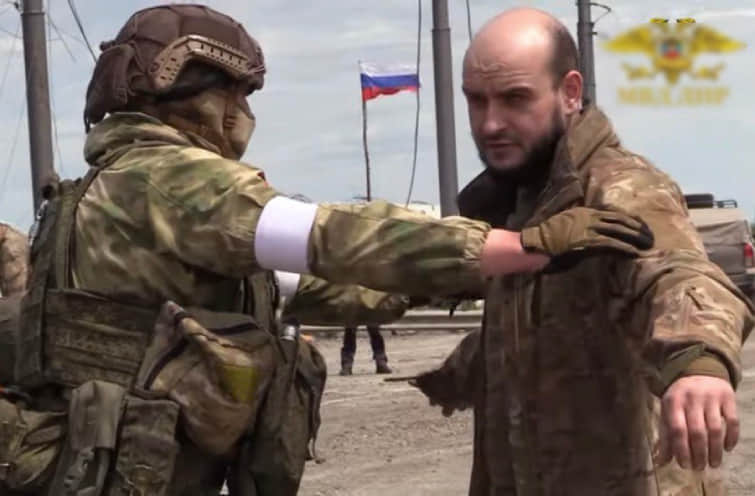
Dmytro’s sister kept trying to identify her brother in photos or videos from Olenivka, but there were several similarly built young men there. Dmytro also had no tattoos.
As early as September, when some of the Azov servicemen were liberated from captivity, Liudmyla got a call from her brother's fellow soldier.
"He had been with Dima in Azov since 2015 and saw that Dima was definitely gone. He was right at the epicentre of the explosion. He was lying on the bunk next to their commander," Elektryk’s sister says.
Liudmyla was depressed after the terrorist attack but did not tell her mother about the tragedy since she had a heart condition.
Dmytro Krukovskyi was buried in the Alley of Heroes in Bila Tserkva on 7 June. The soldier's sister is now advocating for every prisoner of war.
Yevhen "Zhym" (Press) Pashniuk-Pashniev
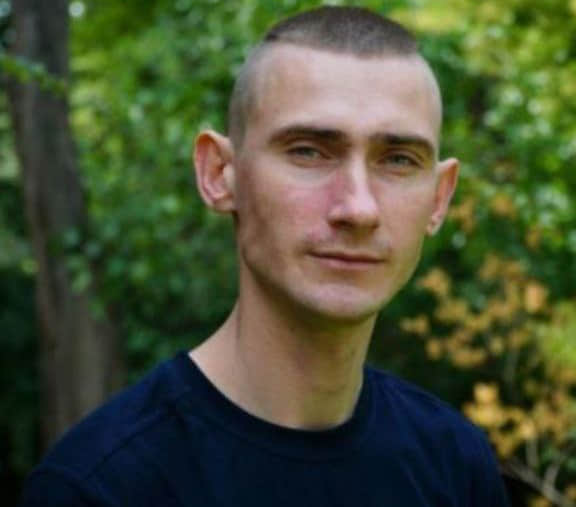
Yevhen Pashniuk-Pashniev was born in the village of Velyka Oleksandrivka, Kherson Oblast. He had an 18-year-old sister and a brother who also joined the military.
Zhym served almost 11 years and was killed a year before his 30th birthday.
"My husband says that there will be no more children like Zhenia [short for Yevhen]. He was already talking at the age of one and a half, reading at five. He was brilliant, a good student, and joked with everyone.
As a child, he was keen on books, read all of Jack London's works, and adored Tom Sawyer. As a student, he started writing poems and playing music when rap was famous," Natalia, the mother of the deceased soldier, recalls.
After his degree, Yevhen joined the domestic forces, serving in Ukraine's National Guard in Kherson. He was on night duty a few days a week and worked with dogs for some time. He also raised a dog named Bucks.
Natalia's son always joked that he had "military metastases in his head" in case somebody suggested that he leave the service.
The Azov Regiment announced that it was recruiting new soldiers in the autumn of 2021. Yevhen passed an interview before the full-scale invasion in January 2022 and was soon sent to Mariupol. He was very proud that Redis [Commander of the Azov Regiment of the National Guard – ed.] shook his hand.
"He said, 'I don't understand why I didn't go there earlier. Mom, they are such cool dudes. I'm ready to do everything just following them,' I was always proud of him," Natalia recalls.
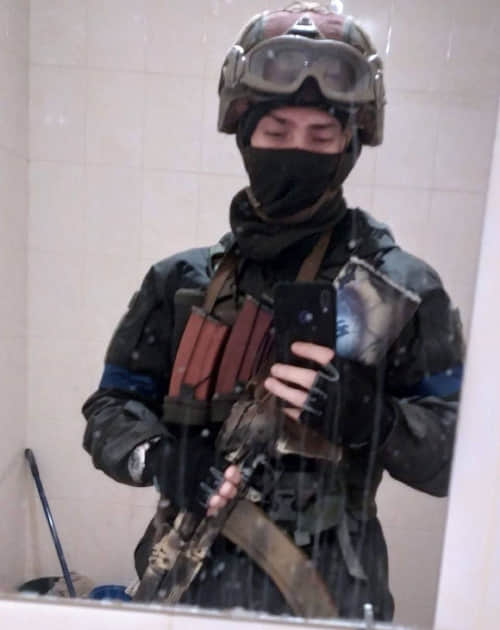
On the morning of 24 February 2022, Yevhen called his mother and ordered her to leave and to destroy all his military belongings.
Natalia wanted to wait for her children at home, but her native village was quickly occupied.
Natalia decided to leave and take her 17-year-old daughter right after the Russians started to conduct searches. Fortunately, no one in the village knew that Yevhen was in the Azov Regiment, but then the Russians began looking for his younger brother, who was studying at the Kharkiv Military Academy.
The family moved to Kryvyi Rih and occasionally received news from Yevhen. He told them how the Azov soldiers helped civilians by giving away their last Snickers bars and water.
Yevhen proposed to his girlfriend Anhelina at the Azovstal steel plant. He had known Anhelina since childhood. She planned to move to Mariupol to be with her beloved, waited for him to return from captivity, and went to rallies organised by the Azovstal defenders' families.
Yevhen had planned to go abroad, but he told his fiancée in March that Ukraine is the only place he wants to live.
"I will not take a single step from there. I will defend Ukraine to the death. These are his words. He told me when he was at Azovstal that 'We have a prisoner. We can’t leave him, so we take him everywhere with us. We give him food, I give him a cigarette to light'."
I said, 'but son, it's a Russian soldier,' as I had already seen what they did in our homeland. But Zhenia was very sensitive. He could not hurt anyone on purpose. And what they did to him in captivity..." Natalia's voice breaks.
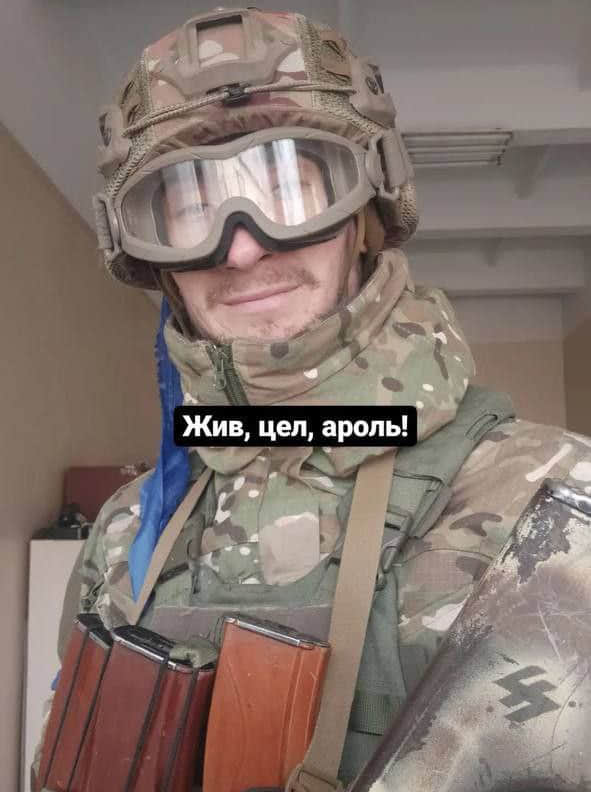
On 6 April, Yevhen appeared on Instagram and posted a selfie, now the only photo from Azovstal his family has.
Before leaving the steelworks, he called his parents and asked them "to raise my sister Nastia as a princess".
"He said, 'Don't offend my little bee.' There was a twelve-year age difference between Nastia and Zhenia, but they were always on the same wavelength. She took part in all the rallies with me. She was very worried," adds Natalia's mother.
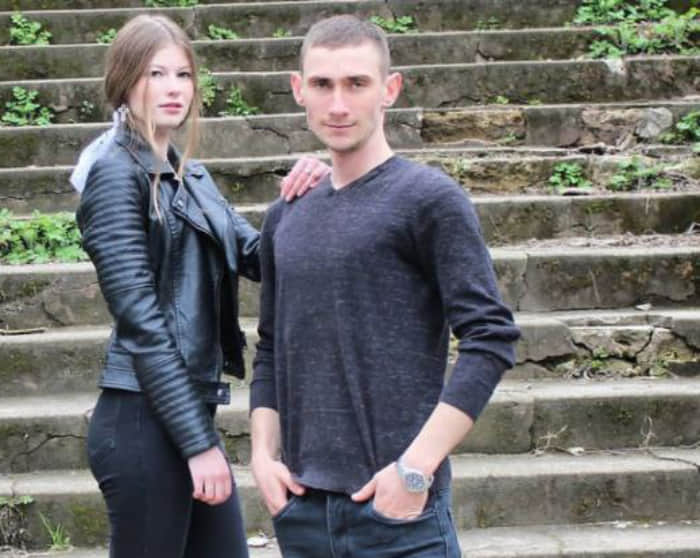
Also, thanks to a Tik-Tok video, Yevhen's family discovered how he helped one of his brothers-in-arms to escape.
A mother of that fighter published a video about her wounded son, recounting how an unknown Azov fighter helped carry him when they were leaving the Azovstal plant.
Natalia saw Yevhen on that video.
"This fellow was brought home as a part of a prisoner swap on 29 June. He is from Kryvyi Rih. He said that the Russians had shot him through the legs. His legs did not heal correctly, so he could not even stand. A man carried him, but his leg was wounded and he could not carry him anymore.
And, he tells it, an Azov soldier was passing by. He picked him up without saying a word, threw him over his shoulder, and carried him," says Natalia.
@victoria.glikina #азовсталь #азовстальмариуполь #нашигерои #всебудеукраїна🇺🇦💙💛 ♬ оригинальный звук - Виктория Гликина
Yevhen called his beloved and his parents while in captivity, supported everyone, and repeated "they don't beat us, don't torture us" as a mantra. The last time Yevhen spoke to his parents was on 20 June, when he asked that his sister study only where she wanted.
"Zhenia never asked for anything in his life, never complained that he was sick. But this time, he says, 'Mom, I want cake so badly. Remember, our grandmother used to bake me these puff pastry triangles made with kefir. I want them so badly." I still can't get these cakes out of my head...
Words that the guys surrendered hurt me the most. They would never in their life give up, but they were issued an order. Zhenia told me that everyone has one charge to shoot themselves," Natalia recalls.
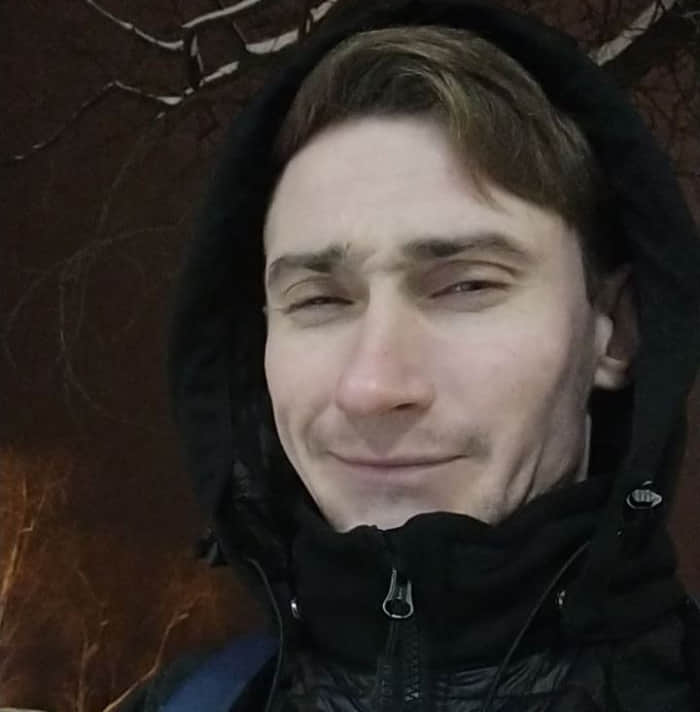
Nataliia found out about the terrorist attack from social networks on 29 July. She ran out of the bus and started crying. The next day, Anhelina's mother called her in tears and said Zhenia was on the list.
The first DNA match was in February, and the second was confirmed on 22 June.
Yevhen Pashniuk-Pashniev was buried at the Berkovtsi Cemetery in Kyiv with three brothers-in-arms from Kherson Oblast who entered the Azov Regiment at different times.
Zhym’s mother is fighting to start the Days of Mourning and Commemoration of the victims in Olenivka killed on 28-29 July.
Dmytro "Bilotur" Bukariov
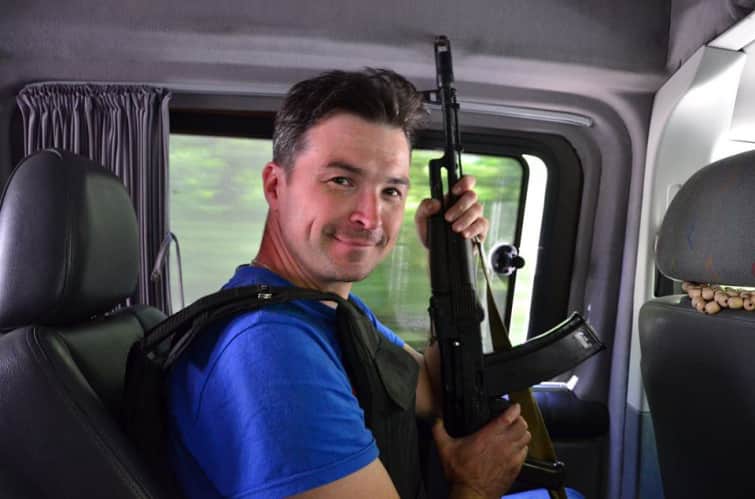
Dmytro Bukariov is a former soldier of the Security Service of Ukraine, who served in the Azov Regiment from December 2014 onward, defended the Azovstal steel plant and was killed at the age of 51.
Dmytro grew up in Cherkasy with his sister Lada from the age of two. He studied at the Naval Department of the Baltic State Technical University in Russia, and received his second degree last year at the National Defence University of Ukraine.
The man worked as a design engineer at the Fotoprylad ["Photographic device"] production plant in Cherkasy. In the late 1990s, he took an oath and served in the Security Service of Ukraine until August 2005.
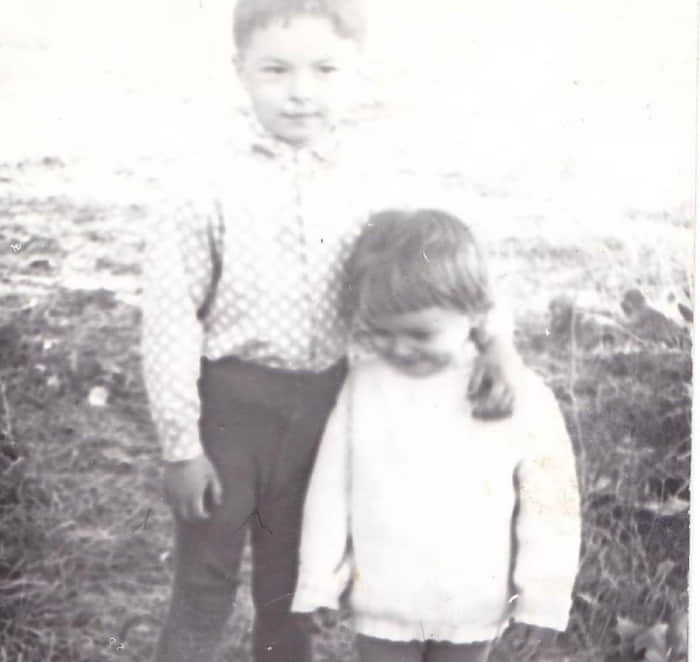
Then Bilotur tried out various professions: engineer, head of the security service, and journalist. When the Russians occupied Crimea in 2014, he could not stand idly by.
"Dima immediately wrote an application to return to serve with the Security Service of Ukraine. He reasoned that the country now needed such experienced specialists. But then there was a mess at the Security Service and his application was lost, so he went as an ordinary private to the Azov Regiment, which was then a brigade. Dima was reinstated as a major when Azov became part of the National Guard," his sister says.
Dmytro Bukariov chose Azov for its idealism, as well as the fact that many native believers served there – the military man studied various religions for a long time, became interested in native beliefs and an appropriate nickname, "Bilotur".
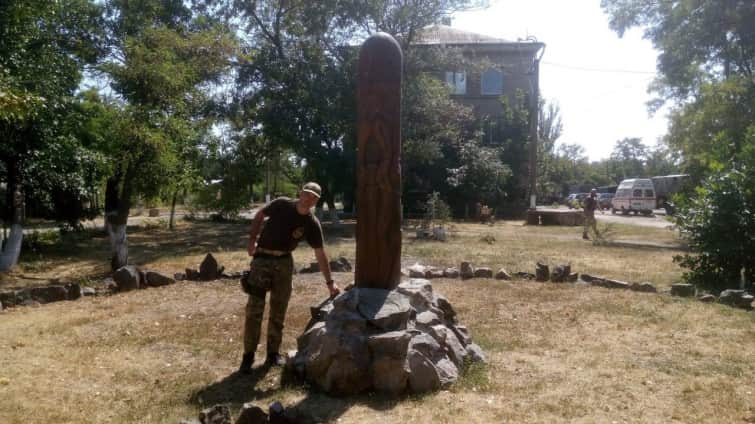
Dmytro joined the fight in December 2014, became the commander of the artillery deployment group of the battalion tactical group, and participated in the Shyrokyne operation.
Lada recalls that what her brother most appreciated in the Azov Regiment was the mutual respect among all military personnel, the sense of brotherhood, and the implementation of NATO standards instead of the Soviet army system.
Dmytro shared his love for his native unit on social media:
"How did I end up in the war among volunteers? Having received an education in Russia and understanding Russians a little, I knew from the 90s that there would be war between Russia and Ukraine. I also knew that I would not be able to stay away from these events, because I love my land, my country and my daughters...
I ended up in the Azov volunteer unit, for which I am very glad. Because real military rascals have gathered here in the best Cossack traditions," Bilotur wrote.
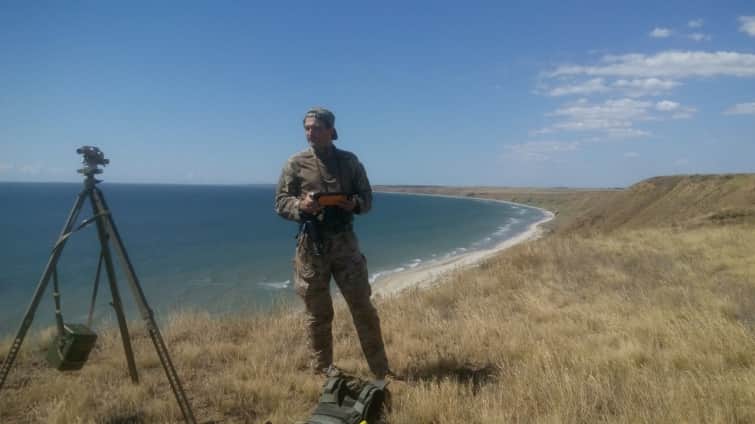
In recent years, Dmytro lived mostly in Mariupol, but he continued to help his relatives, and often called them. At the beginning of the full-scale war, he immediately came to the city's defence.
Dmytro did not complain, but joked and tried to reassure his relatives, even when there was a shortage of ammunition and he could eat only half a cup of porridge a day.
Dmytro celebrated his 51st birthday at Azovstal steel plant. Lada adds that her brother was ready to fight to the last breath. When the soldiers left the steel plant, Dmytro sent his sister the geolocation of the Olenivka prison camp and did not contact her again.
"Dmytro did not text or call from captivity. Communication posed a danger to the prisoners. If one of the relatives mentioned publicly that they had received a call, the prisoners paid a heavy price for it. And Dima knew that this was a risk, both to him and to his relatives," Lada explains.
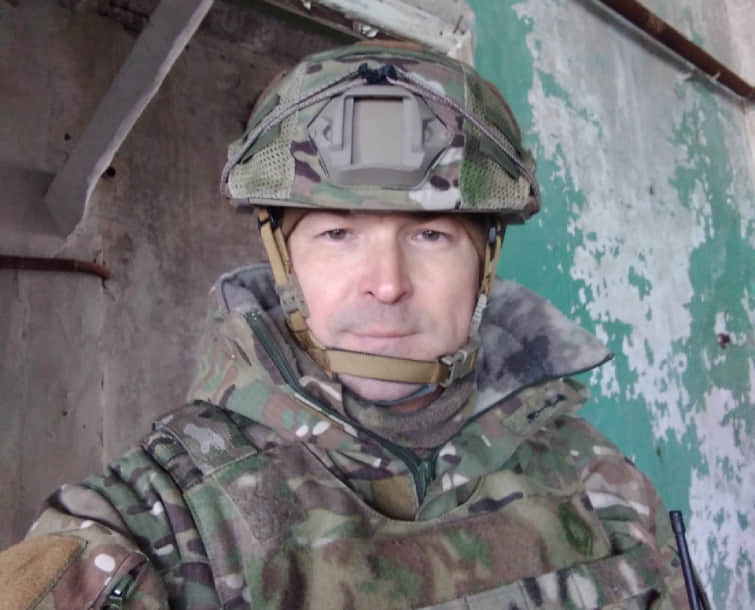
Bilotur was the deputy commander of the Azov Separate Special Operations Regiment of the National Guard of Ukraine for the artillery, so his relatives hoped that he and the command staff would be taken immediately to Russia. However, Lada lost hope after seeing the photos of her brother’s body.
"At first, I sobbed for a long time when I saw his name on the list of those killed, then I began to convince myself that he could not have been in that barracks. When several people came out in September, I was given confirmation that Dima was there.
And again, this blow. The ground went out from under my feet, and I was hysterical. I lived in hope until the first confirmation, then until the second. When I looked at the photo of the body, I recognised him. And then, unfortunately, there was no more hope," Dmytro's sister recalls.
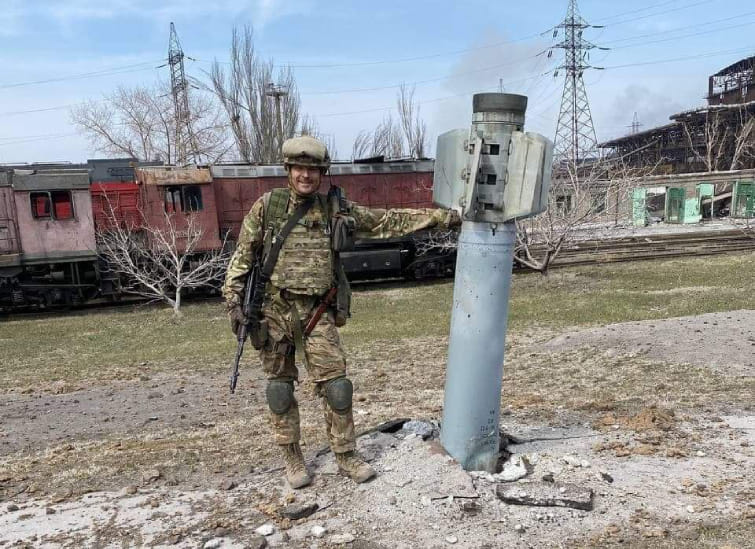
Dmytro is survived by his 20-year-old daughters, his mother, sister and nephew, who is also at the front.
"I named my son Dmytro in honour of my brother. I always wrote that my only dream is for both of them to return alive. Unfortunately, we have already lost one Dmytro. Many of his comrades remain in captivity in terrible conditions, without any contact. I want our state and the world community to do everything possible to bring them home.
Also, our community of Olenivka families demands that the investigation into the terrorist attack be resumed because, unfortunately, the [UN fact-finding] mission was closed. But crimes that remain unpunished generate even more evil," Lada emphasises.
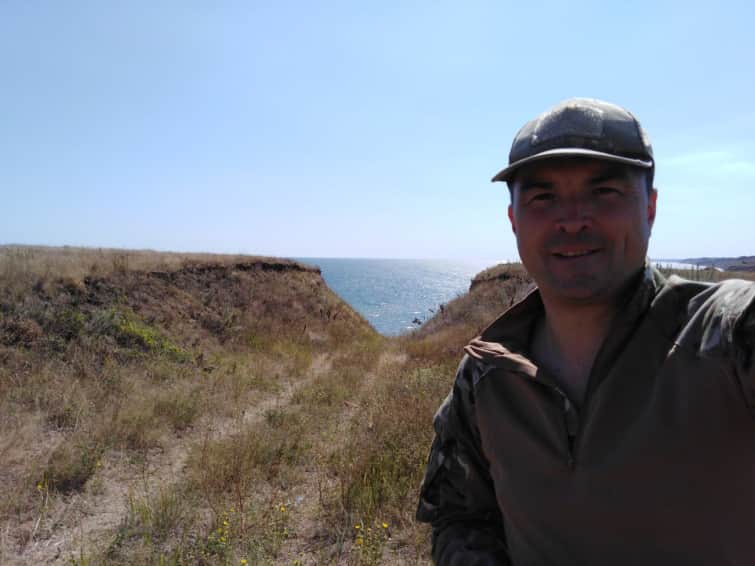
Dmytro Bukariov was buried in Cherkasy on 8 July.
"He was such a bright person. He took care of my mother, me, my son, and his daughters. He did all his good deeds just like that, not for praise. He gave attention, kindness, and care just like that. When the first prisoners were released, the guys also said that he was like a father to them, teaching them everything.
It is very valuable to have someone close to you who is always in touch with you, who gives advice, and who loves you unconditionally. I still don't know how to live without him," Lada says.
By Olena Barsukova, Ukrainska Pravda.Zhyttia
Translation: Yelyzaveta Khodatska, Myroslava Zavadska, Artem Yakymyshyn, Tetiana Buchkovska, Sofiia Kohut
Editing: Monica Sandor